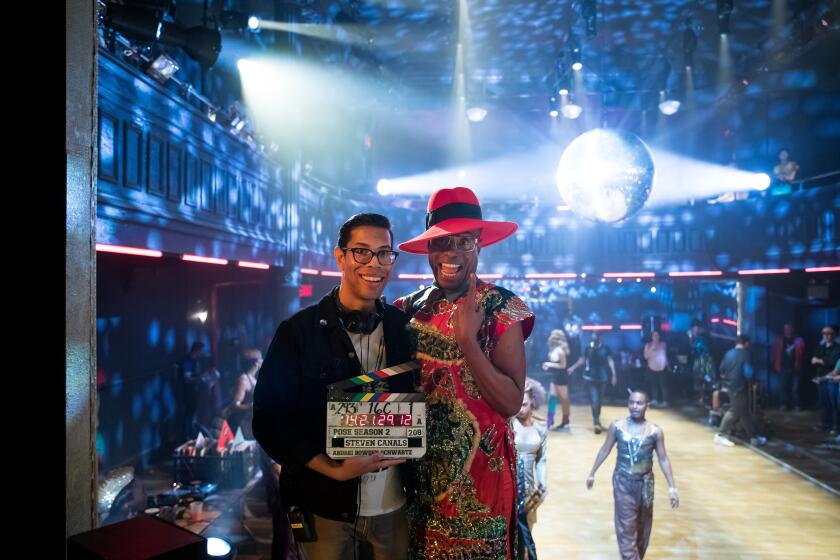How the trans icon that Spain ‘didn’t want to see’ inspired TV’s newest global smash
- Share via
It’s unlikely that the vice president of the United States would stan a trans icon of the 1990s.
The second vice president of Spain, however, did just that.
“Last night I finished watching ‘Veneno,’” Pablo Iglesias, third in line for the presidency, tweeted in Spanish last month, shortly before the series’ conclusion. “It makes you cry, laugh, remember, empathize, but above all, it makes you understand the brutal pain that has been and continues to be inflicted on trans people, simply for being themselves.”
He was not alone: Spain fell in love with the show about trans singer and TV personality Cristina Ortiz Rodríguez — better known as “la Veneno” — when it debuted in March on streaming platform Atresplayer Premium. Since then, the number of Atresplayer subscribers has grown 42%, with “Veneno” 10 times more watched than any other show on the platform.
The series premieres in the U.S. on HBO Max Thursday, the last day of Transgender Awareness Week.
Isabel Torres, who plays modern-day Cristina, described the show as “so important that it will mark a before-and-after on television wherever it’s broadcast — whether in South America, in North America or on the other side of the world, in Australia. Wherever it is broadcast, this series will stir many consciences.”
That level of influence is not unprecedented for la Veneno. When the vedette was “discovered” by the “Esta Noche Cruzamos el Mississippi” late-night show in 1996, she introduced trans culture to living rooms across Spain.
“I think that la Veneno, at the time when she rose to fame, meant something that Spain didn’t want to see in itself,” Torres said in Spanish. “Spain looked the other way. There weren’t many others like her, and I think that, at the time, she held up a mirror that Spain didn’t want to look at.”
The HBO series opens on a young Valeria Vegas — the journalist who co-authored the 2016 memoir “Not A Whore, Not a Saint: The Memories of la Veneno” — peering through the upstairs balusters at the trans icon on the TV.
HBO Max’s “Equal,” narrated by Billy Porter and starring Samira Wiley and Keiynan Lonsdale, highlights Black LGBTQ political activism before Stonewall.

This biopic set in the 90’s tells the story of the life and death of Spanish transgender singer and TV personality Cristina Ortiz Rodríguez, better known by the nickname “La Veneno.”
“Did you feel this feminine when you were a man?” asks the late-night host.
“Yes, exactly the same,” la Veneno replies, flipping her strawberry hair.
“Since when have you felt like a woman?” the host asks.
“Since I was born,” la Veneno responds.
In this scene, set in 1996, Vegas is a kid up past her bedtime. Cut to 2006, and Vegas (Lola Rodríguez) is all grown up, studying journalism in college and grappling with her own transition. Her bedroom wall is coated in vintage magazine cut-outs of her hero, la Veneno.
“At the end of the day, she was a survivor who went against a society that constantly tried to reduce her to nothing,” Rodríguez said in Spanish of the trans icon. “The strength she had: how she faced the world, how she always laughed — even after all the blows the world dealt her, she always had a sense of humor.”
“Veneno” breaks down the star’s rocky origin story — from her upbringing by an abusive mother to working as a prostitute to her stint in an all-male prison. The singer and actress hailed from the tiny Spanish municipality of Adra and was illiterate until adulthood.
“This is a person who doesn’t know how to handle this, when you’re left with nothing like she was,” Rodríguez said. “She didn’t know where to turn, and she grabbed at everything, which is what you see in the series: first prostitution, fame, then porn.
“Until her total decline,” she continued, “ending up in jail, and this whole amalgam of hard and terrible emotions that can happen to a human being — that can lift you up and make you fall.”
La Veneno is played by three actresses: LGBTQ activist Jedet at a young age, Daniela Santiago at the peak of her fame and Torres in the years leading up to Ortiz’s death in 2016.
Times TV critic Robert Lloyd on the HBO Max original content available at launch, including Elmo, ‘Legendary,’ ‘Love Life,’ ‘Looney Tunes’ and ‘Craftopia.’
“To go from having been a sex symbol to looking chubby to looking totally deteriorated and looking nothing like she did when she was a successful actress was a huge emotional cost because I had to gain a lot of weight,” Torres said of the role. “I had to gain 25 kilograms [55 pounds] for the character. I had to cut my hair, to learn to speak like her.”
In March, Torres announced that she had lung cancer, which had metastasized into her bones. (By October, her condition had vastly improved.)
“To immerse yourself in death…” Torres pondered her character’s demise. “Plus, I’m going through cancer that I caught right at the time of filming. As an actress, having to act out someone’s death knowing that you have cancer and that you could die, emotionally it was… tough.”
Rodríguez, too, faced extreme obstacles in her role. Vegas doesn’t begin her transition until Episode 2, while Rodríguez transitioned at an early age. The makeup, hair and wardrobe departments racked their brains to portray Vegas pre-transition.
“To put myself in that skin again, to put myself back into that feeling, to face society, it was super liberating, because I realized how far I’ve come,” Rodríguez said. “That’s where Lola started. And look how I’ve become Lola, the woman I’ve always dreamed of..”
Rodríguez had never loved or accepted herself so much as a trans woman in her life, she said. The experience was “the best psychological therapy in the world.”
On set, that sense of belonging came from the ground up: At least one person in each department, Torres said, was queer. There were “gay girls, gay boys, trans boys” and, of course, trans women.
“I was constantly surrounded with trans people,” Rodríguez said. “The environment was completely like a bubble of full acceptance.”
She was touched, too, by team members who may have never met a trans person. She worked shoulder-to-shoulder with them, and watched their mind-sets change.
FX’s “Pose” serves queer ballroom realness, from costumes to choreography, music to hair. The Times takes you behind the scenes.
“Suddenly they meet a trans person and realize everything,” Rodríguez said. “The discrimination that exists and how difficult it is for trans people to access the world of Spanish fiction, to do camerawork, lighting, electric, everything.”
The supportive atmosphere, it seems, was as co-creators Javier Ambrossi and Javier Calvo — affectionately dubbed “los Javis” — intended. They worked alongside the real-life Vegas, who consulted on the script, to re-create an accurate history.
“Thank God, fortunately in Spain we aren’t living through that situation any more,” Torres said. “We’re moving forward and taking baby steps. I think that what this series has achieved is one more turn of the screw.”
More to Read
The complete guide to home viewing
Get Screen Gab for everything about the TV shows and streaming movies everyone’s talking about.
You may occasionally receive promotional content from the Los Angeles Times.








